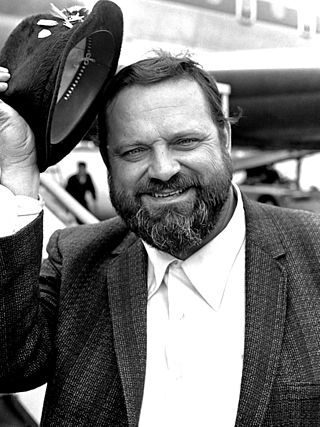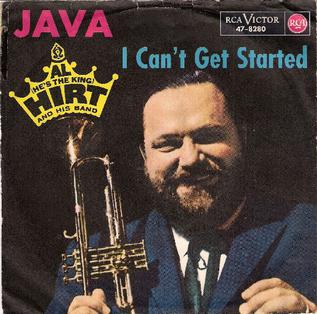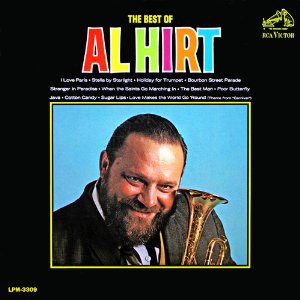
This is a list of notable events in music that took place in the year 1964.

Alois Maxwell "Al" Hirt was an American trumpeter and bandleader. He is best remembered for his million-selling recordings of "Java" and the accompanying album Honey in the Horn (1963), and for the theme music to The Green Hornet. His nicknames included "Jumbo" and "The Round Mound of Sound". Colin Escott, an author of musician biographies, wrote that RCA Victor, for which Hirt had recorded most of his best-selling recordings and for which he had spent most of his professional recording career, had dubbed him with another moniker: "The King." Hirt was inducted into The Louisiana Music Hall of Fame in November 2009. He received eight Grammy nominations during his lifetime, including winning the Grammy award in 1964 for his version of "Java".
"I Really Don't Want to Know" is a popular song written by Don Robertson (music) Howard Barnes (lyrics). The song was published in 1953.
"If (They Made Me a King)" is a popular song with music written by Tolchard Evans and the lyrics written by Robert Hargreaves and Stanley J. Damerell. The song was written in 1934, but the most popular versions were recorded in 1950–1951. Perry Como's version, recorded November 28, 1950, was a number-one hit on the Billboard charts for eight weeks. The Como version was released under the following labels and catalog numbers:

"You Don't Know Me" is a song written by Eddy Arnold and Cindy Walker in 1955. "You Don't Know Me" was first recorded by Arnold that year and released as a single on April 21, 1956, on RCA Victor. The best-selling version of the song is by Ray Charles, who took it to number 2 on the Billboard Hot 100 chart in 1962, after releasing the song on his number 1 album Modern Sounds in Country and Western Music. The first version of the song to make the Billboard charts was by Jerry Vale in 1956, peaking at number 14 on the pop chart. Arnold's version charted two months later, released as an RCA Victor single, 47–6502, backed with "The Rockin' Mockin' Bird", which reached number 10 on the Billboard country chart. Cash Box magazine, which combined all best-selling versions at one position, included a version by Carmen McRae that never appeared in the Billboard Top 100 Sides listing.

"I'll Get By (As Long as I Have You)" is a popular song with music by Fred E. Ahlert and lyrics by Roy Turk that was published in 1928. Versions by Nick Lucas, Aileen Stanley and, most successfully, Ruth Etting, all charted in America in 1929.

"Al di là" ("Beyond") is a song written by Italian composer Carlo Donida and lyricist Mogol, and recorded by Betty Curtis. The English lyrics were written by Ervin Drake. The song was the Italian entry in the Eurovision Song Contest 1961, performed in Italian by Curtis at the Palais des Festivals in Cannes, France, on 18 March 1961, after Curtis had won the Sanremo Music Festival 1961 on 2 February.
"He'll Have to Go" is an American country and pop hit recorded on October 15, 1959, by Jim Reeves. The song, released in the fall of 1959, went on to become a hit in both genres early in 1960.

Here Comes My Baby is a studio album by American country music artist Dottie West. It was released in June 1965 on RCA Victor Records and was produced by Chet Atkins. It was West's debut studio album as a recording artist and was issued following the success of the title track in 1964. The latter song won a Grammy Award in early 1965 which prompted the issue of the album. Here Comes My Baby would start a series of studio recordings West would release for RCA.

"Up Above My Head" is a gospel song of traditional origin, first recorded in 1941 by The Southern Sons, a vocal group formed by William Langford of the Golden Gate Quartet. In the version that is now the best-known, it was recorded in 1947 by Sister Rosetta Tharpe and Marie Knight as a duo.

Connie Smith is the debut studio album by American country music artist Connie Smith. It was released in March 1965 by RCA Victor and was produced by Bob Ferguson. The album included Smith's debut single, "Once a Day". The song became her signature recording and biggest hit, reaching number one on the Billboard country songs chart.

Brenda Lee is the second studio album by American singer Brenda Lee. The album was released August 1, 1960 on Decca Records and was produced by Owen Bradley. The album's second single "Sweet Nothin's" became Lee's first major hit single on the Billboard Hot 100, peaking within the Top 10. This was followed by the third single "I'm Sorry" released the following year that became her first single to top the Billboard Hot 100.

This Is...Brenda is the third studio album by American singer Brenda Lee. The album was released on October 10, 1960, on Decca Records and was produced by Owen Bradley. The release was Brenda Lee's second studio album released during 1960 and contained the single "I Want to Be Wanted", which became a number one single on the Billboard Hot 100.

"Java" is an instrumental adaptation from a 1958 LP of piano compositions, The Wild Sounds of New Orleans, by Tousan, also known as New Orleans producer/songwriter Allen Toussaint. As was the case of the rest of Toussaint's LP, "Java" was composed in studio, primarily by Toussaint.
"Gotta Travel On" is an American folksong. The earliest known version was printed in Carl Sandburg's The American Songbag in 1927 under the title "Yonder Comes the High Sheriff" and several variations were recorded in the 1920s, but the best known version is credited to Paul Clayton, The Weavers, Larry Ehrlich, and Dave Lazer and was first recorded by Pete Seeger in 1958.
"Sugar Lips" is a song written by Billy Sherrill and Buddy Killen and recorded by Al Hirt for his 1964 album, Sugar Lips. The song reached No. 30 on the Billboard Hot 100 and No. 3 on the Easy Listening chart in 1964.

Cotton Candy is an album by Al Hirt that was released in 1964 by RCA Victor. The album features the Anita Kerr Singers.

Honey in the Horn is an album by Al Hirt released by RCA Victor. The album was produced by Chet Atkins and Steve Sholes. The Anita Kerr Singers provided the vocals for the album. The backing band on the album consisted of saxophonist Boots Randolph, bassist Bob Moore, guitarists Ray Edenton and Grady Martin, and pianist Floyd Cramer.

The Best of Al Hirt is a compilation album by Al Hirt released by RCA Victor in 1965. The album peaked at No. 13 on the Billboard Top LPs chart.

That Honey Horn Sound is an album by Al Hirt released by RCA Victor in 1965. The album was produced by Chet Atkins and arranged by Anita Kerr and Claus Ogerman.















